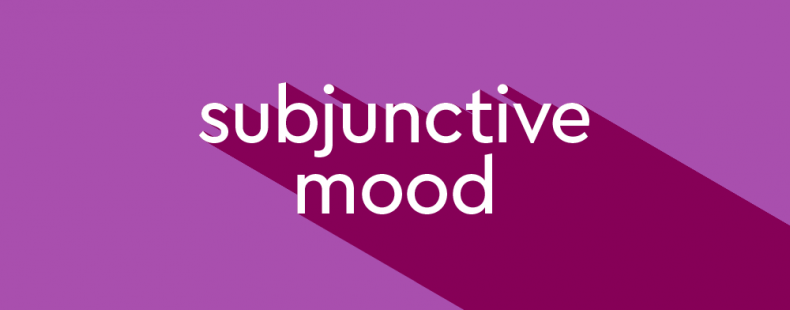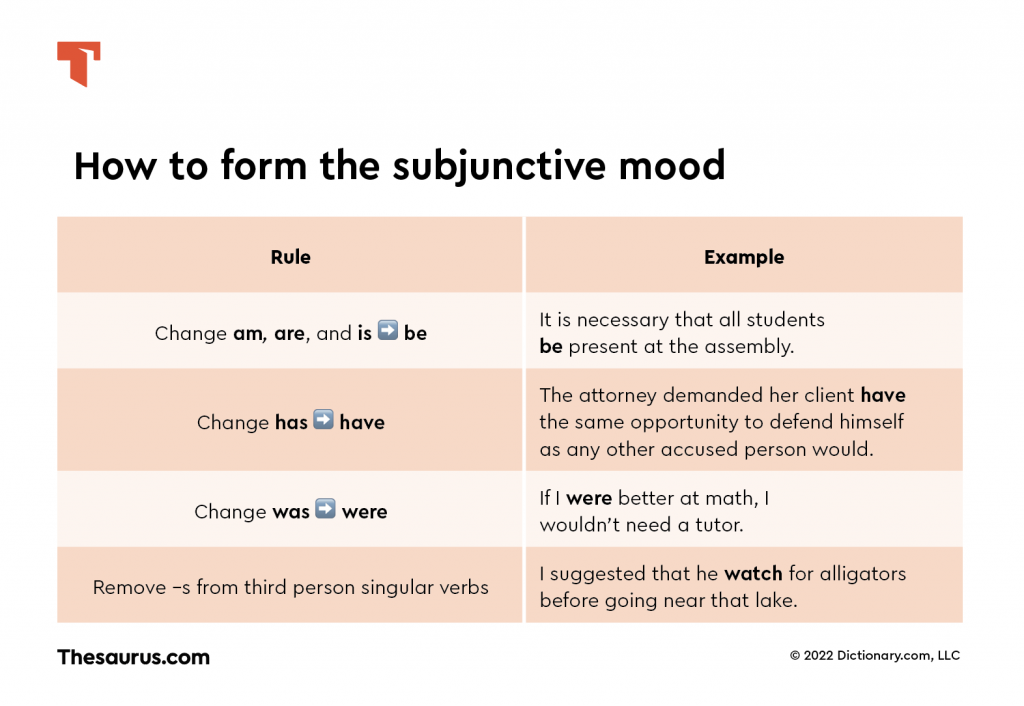Have you ever thought about what you would do if you won the lottery? If you ever win, it is important that you be responsible and not let wealth control you. Even after suddenly getting rich, it is important that a person remember that money isn’t everything. At the end of the day, though, you probably don’t need to worry about it. After all, if it were easy to win the lottery, there probably wouldn’t be one in the first place!
Let’s stop dreaming of endless riches for a moment, and look at the last few sentences. If you are well versed in verbs and subject-verb-agreement, these sentences may look a bit strange. However, there isn’t any funny business going on. Instead, these sentences use a quirky part of English called the subjunctive mood. Before our verbs start to get moody, let’s calm them down a bit and learn more about the subjunctive mood and how we use it in our writing and speech.

What is the subjunctive mood?
The subjunctive mood is one of the three major verb moods used in English—and, to many, makes a strong case for being the oddest of them all. In English grammar, mood (from a variant of the word mode) is a category that shows when a verb is expressing fact (known as the indicative mood), command (imperative mood), or conditionality (subjunctive mood). For example, the indicative mood is used to state facts as in Mice like cheese, and the imperative mood is used to give commands as in Bring me that book. (Note: other languages have even more grammatical moods.)
So, what about the subjunctive mood? What is it and what do we use it for? Often, you may write a sentence in the subjunctive mood without even knowing it as in I wish that my dogs were less lazy. However, the subjunctive mood is a lot more noticeable in the sentence I wish that my dog were less lazy. Wait a minute. “Were?” Isn’t dog a singular noun? Yes, it is. For the most part, the subjunctive mood will impact your sentences and clauses the most when using singular subjects.
We’ll get into the specifics of forming the subjunctive later. First let’s look at when we would want to use it. The subjunctive (in English and certain other languages) notes or pertains “to a mood or mode of the verb that may be used for subjective, doubtful, hypothetical, or grammatically subordinate statements or questions, as the mood of be in if this be treason.” The word subjunctive is related to the Latin word subiungere (“to attach, associate, to cause to come immediately next”), and it’s believed the name for this mood references the fact that subjunctives subjoin or add information. Generally speaking, we use the subjunctive mood to:
- Describe hypothetical situations or alternate realities
- Express wishes
- Make suggestions
- Make requests
- Make demands
- Declare statements of importance
Certain kinds of verbs help change the mood of the sentence: modal verbs. Learn more here.
Subjunctive mood examples
Let’s look at sentences that use the subjunctive mood to express each of the ideas mentioned above.
- Timmy wishes that Godzilla were real.
- It is recommended that each guest wear formal clothing.
- Her mother requested that Annie join our baseball team.
- The country demanded its neighbor cease trade with the enemy nation immediately.
- It is important that you know what a contract says before signing it.
- If I were a clown, I’d join the circus.
Tips for writing in the subjunctive form
If the subject of a sentence/clause that uses the subjunctive mood is plural, the verb usually looks identical to how it would appear in any other sentence. However, things get more complicated if you have a first or third person singular subject (like I, he, she, or it) or use the verb be.
Change am, are, and is to be
The verb be is both one of the most common and most frustrating verbs that we use in English. The verb be rarely likes to follow the rules and it once again has to be treated differently than all other verbs when it comes to the subjunctive mood. When we use the verb be in the subjunctive mode, the forms are, is, and am all become be regardless of the subject. For example:
- It is necessary that all students be present at the assembly.
- My parents demanded that I be nice to my annoying cousin.
- The manager asked that her staff be prepared for a morning rush.
Change has to have
In the subjunctive mood, the singular verb has becomes have even if the subject is singular:
- The attorney demanded her client have the same opportunity to defend himself as any other accused person would.
- The law requires that each citizen have a chance to petition the government.
Change was to were
When using the subjunctive mood, we change the verb was to were even when using a singular subject:
- If I were better at math, I wouldn’t need a tutor.
- I wish that my car were faster.
- If George Washington were a more power-hungry man, America would be a lot different today.
This is a good place to note that as interesting as the subjunctive mood is, it is declining in formal and casual speech and writing. In particular, the word was is often used in place of the word were when the subjunctive mood would normally be used. Although this may be considered grammatically “incorrect,” it is so commonly done and often sounds so natural that most people wouldn’t even consider it to be out of place. For example, you might casually say, “I wish that my car was faster.”
We have the article you’re looking for on using “wish I were” versus “wish I was.”
Remove –s from third person singular verbs
When we use the subjunctive mood, we remove the –s from third person singular verbs:
- The law demands that the president pay taxes just like everyone else.
- I suggested that he watch for alligators before going near that lake.
- We proposed that Sasha sing in our band because she had such a great voice.
Common verbs and phrases used with the subjunctive mood
Some common verbs are often used with the subjunctive mood. These include to wish, to command, to order, to recommend, to suggest, and to ask. If you see or use any of these verbs in a sentence, you might be dealing with the subjunctive mood. The following sentences give examples of each of these verbs used with the subjunctive mood:
- I wish I were rich so I could buy all my friends and family nice birthday presents.
- The mean king commanded that the jester never joke about him.
- The pirate captain ordered her first mate count the treasure.
- The judges recommend each contestant consult their coach about the rules before beginning a routine.
- Fred suggested that I, a neutral party, be the one to decide who got to go first.
- Isabella’s teacher asked that she review her answers again before turning in the final exam.
Several idiomatic phrases are also commonly used with the subjunctive mood. Often, these phrases use an adjective and the word that to introduce a dependent clause that uses the subjunctive mood to modify a main clause that doesn’t. Some of the adjectives used in these phrases include important, necessary, essential, urgent, crucial, vital, and paramount. The following sentences show how these words are often used to introduce the subjunctive mood:
- It is important that each child know how to read.
- The government deemed it necessary that the businessman shut down his factory.
- We consider it essential that the mayor give a speech to the voters.
- It is vital that a surgeon practice good hygiene.
- If you ask me, it is paramount that a parent teach their child discipline.
Do you know how to write in the subjunctive mood now? Quiz yourself here!
If I were struggling with grammar, I’d use GrammarCoach™
Why yes, that is a subjunctive in the heading! And we’ve got one more tip to help you get a handle on the trickiest grammar questions: use Thesaurus.com Grammar Coach™. This tool makes writing papers, essays, emails, and a whole lot more a whole lot easier. Its Synonym Swap will find the best nouns, adjectives, and more to help say what you really mean, guiding you toward clearer, stronger, writing.
Start writing smarter today with Grammar Coach™.














